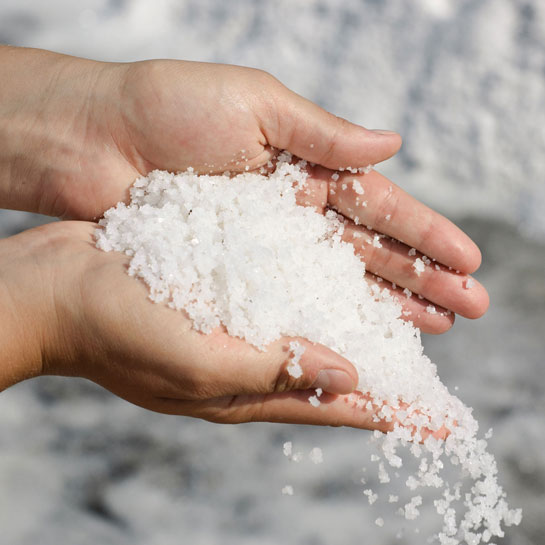In this article we are going to explain you everything about pool salt: what it is, its benefits, how to use it, maintenance, etc. If you have one, we encourage you to continue reading to learn a little more about this product.
What is pool salt?
By way of introduction, we can indicate that it is a substitute for chlorine that is gradually spreading as the preferred choice of consumers. It is a saline solution that aims to eliminate bacteria and fungi and, in addition, to keep the water in the best possible conditions.
To achieve this purpose, salt chlorination comes into play, where chlorine generators are used that have been specifically designed to produce chlorine and also to adjust the concentration of this compound in the water.
This reagent in a swimming pool does not have to worry you, as it is ten times lower than that of sea water. Therefore, it can be used without any fear since it is scientifically proven as a good chemical treatment.
Advantages of pool salt
If you are still hesitating about its use, read on to learn about the different benefits of this reagent:
- This type of salt can be used in any type of pool, regardless of size or depth. We will explain later how to use it, but it is enough to install the chlorinator and connect it to the mains.
- If you decide to use this product for your pool, keep in mind that there is an initial investment. However, you should think in the medium and long term, since it compensates with the savings you will have in other chemical components. On the other hand, there is also a time saving because it is only used once a year, while chlorine is usually used daily.
- Pool salt does not smell, while chlorine gives off a very strong odor that can even be unpleasant. Also, itching and irritation of skin and eyes will no longer be a problem with the use of this saline solution. The possibility of hair damage also disappears.
- If you are one of those who prefer a product that does not pollute, pool salt should be your choice. The reason is that it is not a chemical compound that harms the environment.
- It is a very positive compound for the body, especially to reduce muscle problems or rheumatism. In addition, it is also good for increasing respiratory capacity and blood circulation.
How to use pool salt?
The use of this compound in the swimming pool is very simple, but first it is important to take into account a series of indications for the treatment to be effective.
First of all, you have to calculate the cubic meters of the reservoir. To do this, you must multiply the length, by the width and by the depth. Let’s see it with an example: 15 m x 8 m x 2 = 240 cubic meters.
Next, keep in mind that the ideal salt concentration should be between 4 and 7 ppm (parts per million). If it is below 4, the chlorinator will not produce enough chlorine to keep the reservoir clean. On the other hand, if it exceeds 7, the electrolytic cells will be damaged. In conclusion, you have to use between 4 and 7 kilos per cubic meter. Continuing with the same example as before, if you want to have a level of 5 ppm in your pool, you must multiply: 250 x 7 = 1750 kg. The bags are 25 kg, so you know how many you need with the following division: 1750/25 = 70 bags of salt.
Another important issue once you have the installation done and the usage procedure clear, is to measure the salinity level. This way, you will be able to determine when to add this product. For example, if the level is at 2, you should add the missing amount up to 4.

Types of salt for swimming pool
If you are wondering what type of salt to use or if there is more than one, here is the information you need.
Sea salt
It is the one we all know, the natural one and the one that is produced in a sustainable way. It is achieved through the sun, as it causes seawater to evaporate, exposing salt crystals. The high salt concentration causes bacteria to die, as well as other compounds.
It is the most economical option, however, large quantities are needed to be effective in a reservoir.
Sal vacuum
It is a type of dehydrated salt that is very effective in dissolving other types of salts. Its point is that it can be acquired in different formats (tablets, tablets, tablets, etc.), this being one of the reasons why it is widely used in salt pools.
Another important advantage is that it is one of the easiest salts to dissolve.
Mined salt
It is the purest of all salts. It is also the source of rock salt. It is widely used in virtually all areas, including for melting snow on roads and in reservoirs.
The sodium chloride composition is one of the highest in this type, with a percentage between 95 and 99 %.
These are the 3 most common, but not the only ones. Khoser salt, also called solar salt, is used in swimming pools. We recommend that you check beforehand that it is free of impurities.
We advise you that before using any product, ask for personalized advice to a company specialized in swimming pools. This is the best way to avoid any kind of incident that could damage the water.
In short, pool salt is a component that is progressively becoming a great substitute for traditional chlorine. The advantages (simple installation, minimum maintenance, long-term savings, etc.) are a good example of why it has become another option for consumers.


